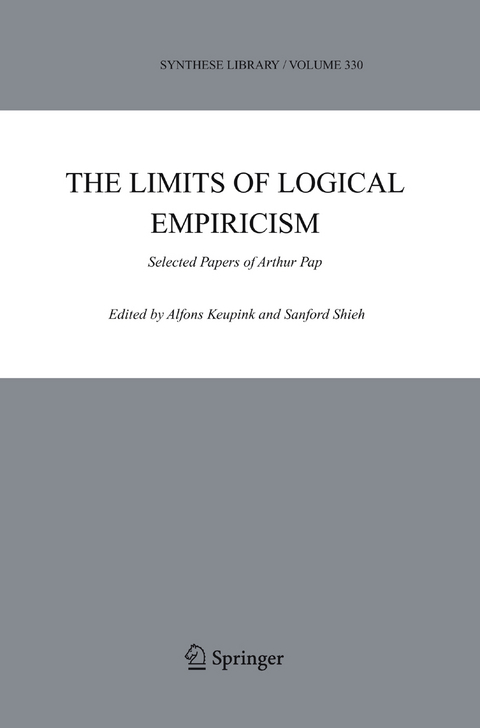
The Limits of Logical Empiricism
Springer-Verlag New York Inc.
978-1-4020-4298-0 (ISBN)
Arthur Pap’s work played an important role in the development of the analytic tradition. This role goes beyond the merely historical fact that Pap’s views of dispositional and modal concepts were influential. As a sympathetic critic of logical empiricism, Pap, like Quine, saw a deep tension in logical empiricism at its very best in the work of Carnap. But Pap’s critique of Carnap is quite different from Quine’s, and represents the discovery of limits beyond which empiricism cannot go, where there lies nothing other than intuitive knowledge of logic itself. Pap’s arguments for this intuitive knowledge anticipate Etchemendy’s recent critique of the model-theoretic account of logical consequence. Pap’s work also anticipates prominent developments in the contemporary neo-Fregean philosophy of mathematics championed by Wright and Hale. Finally, Pap’s major philosophical preoccupation, the concepts of necessity and possibility, provides distinctive solutions and perspectives on issues of contemporary concern in the metaphysics of modality. In particular, Pap’s account of modality allows us to see the significance of Kripke’s well-known arguments on necessity and apriority in a new light.
Preface.- Acknowledgments.- Part I Themes in Pap’s Philosophical Writings.- Introduction; S. Shieh.- 1. Overview of Pap’s Philosophical Work.- 2. Necessity as Analyticity.- 3. Necessity as (Implicit) Linguistic Convention.- 4. The Analytic-Synthetic Distinction: Hypothetical or Functional Necessity.- 5. The Analytic-Synthetic Distinction: Dispositional and Open Concepts.- 6. The Limits of Hypothetical Necessity: Formal or Absolute Necessity.- 7. Logical Consequence and Material Entailment.- 8. The Method of Conceivability.- 9. Comparison with Necessity in Contemporary Analytic Metaphysics.- 10. Logicism.- 11. Concluding Remarks.- Part II Analyticity, A Priority and Necessity.- 1. On the Meaning of Necessity (1943). 2. The Different Kinds of A Priori (1944).- 3. Logic and the Synthetic A Priori (1949).- 4. Are all Necessary Propositions Analytic? (1949).- 5. Necessary Propositions and Linguistic Rules (1955).- 5.1. Are there Necessary Propositions?.- 5.2. The Confusion of Sentence and Proposition.- 5.3. Are Propositions "Logical Constructions"?.- 5.4. Necessary Truth and Semantic Systems.- 5.5. Implicit Definitions.- Part III Semantic Analysis: Truth, Propositions, and Realism.- 6. The "Semantic" and the "Absolute" Concepts of Truth (1952).- Appendix: Rejoinder to Mrs. Robbins (1953).- 7. Propositions, Sentences, and the Semantic Definition of Truth (1954).- 8. Belief and Propositions (1957).- 9. Semantic Examination of Realism (1947).- 9.1. Universals in Re and the Resemblance Theory.- 9.2. Platonism and the Existence of Universals.- Part IV Philosophy of Logic and Mathematics.- 10. Logic and the Concept of Entailment (1950).- 11. Strict Implication, Entailment, and Modal Iteration (1955).- 12. Mathematics, Abstract Entities, and Modern Semantics (1957).- 12.1. Traditional Problem of Universals.- 12.2. Modem Semantics and the Traditional Dispute.- 12.3. Classes, Attributes, and the Logical Analysis of Mathematics.- 12.4. What do the OntologicalQuestions Mean?.- 13. Extensionality, Attributes, and Classes (1958).- 14. A Note on Logic and Existence (1947).- 15. The Linguistic Hierarchy and the Vicious-Circle Principle (1954).- Part V Philosophy of Mind.- 16. Other Minds and the Principle of Verifiability (1951).- 16.1. Verifiability as Generator of Philosophical Theories.- 16.2. The Behaviorist’s Confusion about the Notion of Verifiability.- 16.3. Are Statements about Other Minds Conclusively Verifiable?.- 16.4. Physicalism as an Analytic Thesis.- 17. Semantic Analysis and Psycho-Physical Dualism (1952).- Part VI Philosophy of Science.- 18. The Concept of Absolute Emergence (1951).- 19. Reduction Sentences and Open Concepts (1953).- Appendix.- 20. Extensional Logic and Laws of Nature (1955).- 21. Disposition Concepts and Extensional Logic (1958).- 22. Are Physical Magnitudes Operationally Definable? (1959).- 22.1. Operational Definition as Contextual Definition.- 22.2. Operational Definition in the Form of Reduction Sentences.- 22.3. Physical Magnitudes and the Language of Observables.- 22.4. Theoretical Definition and Partial Interpretation.- 22.5. The Breakdown of the Analytic-Synthetic Distinction.- Part VII Arthur Pap’s Life and Writings.- 23. Intellectual Biography of Arthur Pap; A. Keupink.- 24. Arthur Pap: Biographical Notes; P. Pap.- 25. A Bibliography of Arthur Pap; A. Keupink.- 25.1. Main Publications.- 25.2. Editions.- 25.3. Translations.- 25.4. Articles, Papers and Reviews.- References.- Index.
| Erscheint lt. Verlag | 2.3.2006 |
|---|---|
| Reihe/Serie | Synthese Library ; 334 |
| Zusatzinfo | XIII, 394 p. |
| Verlagsort | New York, NY |
| Sprache | englisch |
| Maße | 155 x 235 mm |
| Themenwelt | Geisteswissenschaften ► Philosophie ► Allgemeines / Lexika |
| Geisteswissenschaften ► Philosophie ► Metaphysik / Ontologie | |
| ISBN-10 | 1-4020-4298-1 / 1402042981 |
| ISBN-13 | 978-1-4020-4298-0 / 9781402042980 |
| Zustand | Neuware |
| Haben Sie eine Frage zum Produkt? |
aus dem Bereich


